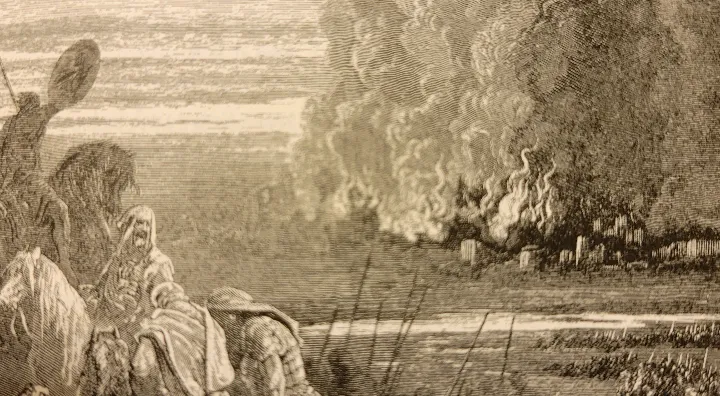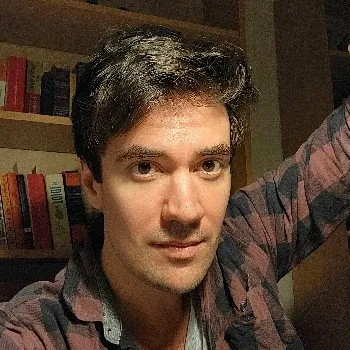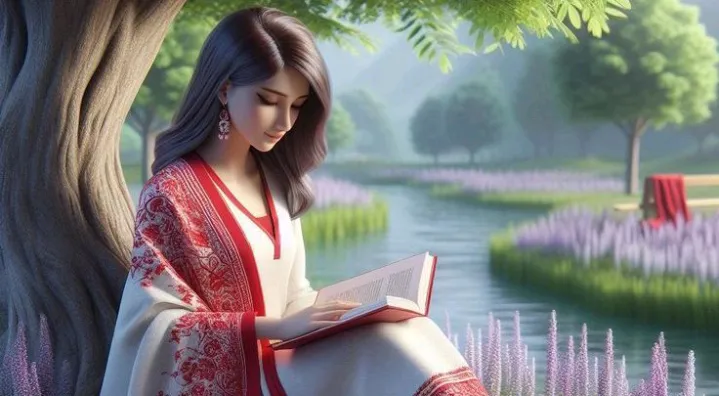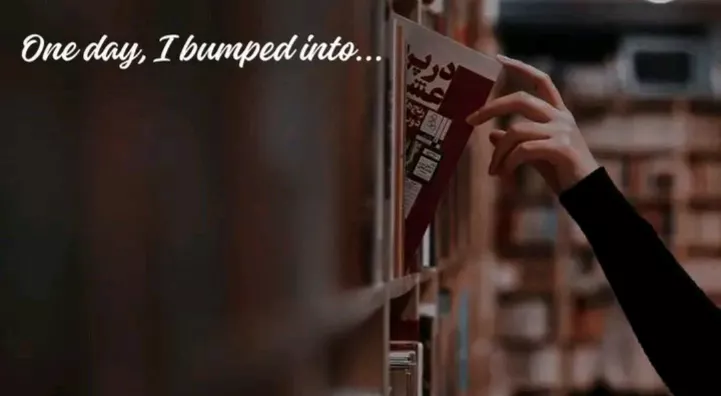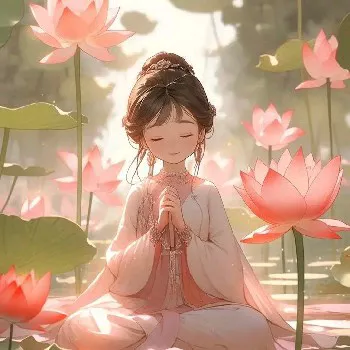Heavenly Kingdoms - Chapter 8
From Margaret Playford to Caroline Playford, 17th of July, 1859.
Dear Cousin,
I shall relate a day of a different tenor lest you think it necessary to call the constable to rescue me from my purgatory, although, I warn you, there is still much to be apprehensive about regarding what follows. Yet will you see light and dark in the relation of this day and decide the victor.
I had the inclination to get Anne out of the house, at least for a half-day and try to get used to the prospect of living a life outside of the stifling walls of Sedgewood. There is a moor some two mile from the manor, as you know, and I, after a great harangue, convinced the young spinster to come and enjoy some natural peace.
We talked little much of the way there, shifting through the serrated heath that sparsely populates both the Charlston estate with its faded greens and the moor with its waist high reeds. The land seemed firm but I had the impression of gliding, unable to pause lest my spirits fly on without me. I would glance at my companion from time to time and note the change in her since the day before. Anne has always been withdrawn but here I saw blankness that belies the fresh emotion that I know dwells inside her. I tried to break the silence with a little game and you can judge for yourself how well it went.
I proposed a test of perception to see who could find the largest animal, thinking we would start with an ant or a cricket and work our way up, but was dismayed when Anne immediately pointed to a crow and claimed it. I laughed at her luck and speed but was secretly miffed to have barely occupied our attentions for ten seconds. Then was my luck to change when a rabbit came into view forcing, I will admit, rather too high of a squeal of delight from myself as I claimed the critter as my totem.
Anne, my ever insufferable friend, said flatly, “It’s no bigger than my crow.”
“No bigger than… how now? It most certainly is!”
“When my crow spreads its wings its bigger by far.”
“Oh rubbish! Bigger is by weight not breadth.”
“By what rule Maggie?”
“The rule of common sense!”
“Oh you know I have so little of that, especially of late.”
She laughed as she said it, which, having finally brightened that sourpuss face so gloomily held all morn, should have brightened mine were it not for the touch of spite and bitterness that came with it. Luckily I am an expert at ignoring such signs.
“Indeed,” I said, “next I shall claim a cow then you shall point at me and say ‘this specimen is larger for her height doth bovine shade inferior.’”
I will admit I got a more genuine laugh this time from my friend – not to boast of wit but I thought it was well said.
Anne was thankfully up for to challenge when countering, “you bind my tongue for should I commit to my course I will claim you larger than a cow, surely a mortal insult to one as vain as you, yet should I not commit to my course I should be thought flighty, unreliable and of no use to anybody. I would have cared more for the feelings of others when I was younger and kowtowed to the anguish of offence but now I am more inclined to action so must commit to my course. Therefore I must indeed claim you superior in size to a cow.”
“Indeed,” said I, after a guffaw, “being taller, stouter, and generally prettier than yourself, I have little to say to counter this comparison, yet would add that should the rules have been which animal is the most beautiful, and following your logic wherein to choose the lady over the beast is to suffer the ‘anguish of offence’, a logic I must follow - being of etiquette supreme, I must therefore choose the cow as beauty’s avatar when given the choice between it and your sorrowfully bland self.”
And so on, we tittered and laughed our way toward the moor, the long rushes beginning to caress our legs, pressing against our pinafores with the dabs of a thousand fingers - the gentle balance of nature slowly turning toward the geological in study lest eternity be barred from mortal contemplation.
We found a suitably rocky station to sit and gawk at creation. The lichen covered boulder felt comforting in its intransigence and my spirit, previously darting ahead, found its home within my breast, bringing a settled peace to my thoughts, previously so rattled by recent events.
We had returned to silence as we stared across the moor taking in the bleak tapestry of heath and stone, assaulted by winds wild with glee at perpetual desolation - the sky passed judgement on the scene; mostly grey with hazy pink bleeding through like any desire of the heart kindling against the weight of its oppression.
Oh Caroline, forgive my purple prose; I have a poet for a fiancé and depressive for a best friend. I thought once to push them toward the light of sensible character and worldly observance but it appears they are having more of an effect upon me. As soon as I am free of my current situation I am sure my usual manner will return. You must send me, at your earliest convenience the progress of cousin Martha’s pilgrimage into realms matrimonial – The latest foray by Captain Wilkins and the bumbling romantic letters of Mr Green – such sustenance am I deprived of out here and you can see the dire results in the tone of my letters!
But such as it is; I will persist with my narrative.
There was a small shack not far distant which drew our eyes somehow simultaneously, as if a change in its silhouette had brought it to our attention. I did not recall seeing it before but Anne was more familiar with the area.
“The Shepard’s way-stop,” she said, unprompted.
“Long abandoned I presume,” said I.
“Oh yes, perhaps forty years. Its impressive it still stands at all.”
“Have you ever looked inside?”
“Once when I was a girl,” then turning to me sharply, “You were there; don’t you remember?”
“What, me? I remember no such thing.”
“We were out here with Richard and Caroline, running like wildlings bent on catching the wind or picking the most stubborn of flowers from crevices – I forget what endeavors so occupied us during this childish adventure – but you were there and we approached that shack with trepidation – that feeling I recall. Richard was inclined to enter but I protested, having been made craven by a ghost story you or Caroline had poisoned my childish imagination with some days past. He only laughed and started to shift the heavy wooden door. I saw him struggling and went over to help him, his difficulties outweighing my fear. Is it not strange how easy ones fears can be overcome when someone is in even the slightest of need? Together we managed to shift the door and peer inside. The day was much like today so there was no great beacon to light the interior – the gloom held much invisible since all other orifices were patched up. Richard made to enter but I grabbed his sleeve, protesting again. Annoyed he pulled his arm roughly away and stepped inside. Again fearing more for him than myself, I followed him in. It should be noted, my adventurous friend, that you and Caroline may have had every intention of scaring me with your stories but it seems you yourselves were the most convinced by them given your apprehension to follow us in. Perhaps this is why you can’t remember, as you never entered the shack to see what my brother and I saw.”
“And what did you see?” I asked, now quite intrigued.
“What my father says doesn’t exist.”
It took me a moment to remember the words of her father she referred to but my body must have known immediately as a chill ran through me no sooner than she had she finished speaking.
Still, I scoffed and said dismissively, “Oh Anne, you’re so dramatic; there’s nothing metaphysical about a shack on a moor.”
“Why does your voice tremble then, Maggie?”
“Tremble? Don’t be absurd; there’s a veritable gale blowing down my neck and you think I’m spooked by some vague darkness your repressed imagination conjures from the mists of your insular past?”
My bravado had no effect on Anne, however, who, after the incident with the dead bird seemed to have found some new confidence, or was at least, no longer bound by the same rules of perpetual shame that had tied her tongue and shed her tears in the past; she gazed on me with unrelenting perspicacity as though nothing I could say or express was sufficient to shield my soul from the touch of her inner eye.
“You don’t have to deflect with me, Maggie,” she said (really, the nerve of her to suggest openly!), “I’d prefer if you were honest.”
I was riled by such a direct assault but kept my composure, “My dear Anne, you mistake my trepidation for dishonesty. The truth is I am uncomfortable with what you say and do presently. Just two days past you struck your father with a statue of the virgin and now recount the ghastly past with clear intention to disturb my equilibrium. You may be honest Anne, or at least more direct in expression, but sometimes you forget how to be a friend; how to act with another person so as to set them at ease and raise their spirits if morale is at stake. Getting to the heart of every matter is not always the best course of action – not all is depth and darkness; much is to be enjoyed on the surface under the sun.”
She absorbed my words without visible protestation. After a moment she said, “Is this not why you are my friend? To take you places you wouldn’t normally think to go? To feel what others never think to suggest the heart is capable? I know it can wrench apart what was otherwise held inert but who else of your acquaintance could help you engage with what you know lies underneath it all?”
I sighed, “Time and place, dear. Time and place. Sometimes it’s just too much or ill-timed. But, yes all you say is true; I am not your friend for nothing. You’ve a special place in my heart; a place you made home at a depth I thought it was not possible to dwell.”
Anne reached out and grasped my hand, “Thank you Maggie. Don’t think I never value your friendship either. You’ve always been my conduit to the world and the light of a sun I can never seem to reach. So many times I’ve wished I could face the world as you do; alive to the charm of nature and man; defiant to any question of your radiance. That is the degree in which I admire you, my dear friend, and wish you always to shine as you do such that I may glimpse the possibilities of the divine.”
Well! What could I do but embrace my friend after that! I will not tell you if tears were involved but suffice to say any hint of tension between us dissipated with this reconciliation. Thus reforged we two sat upon the ridge overlooking the moor aloof to its desolation, two parts of a greater person – equal to any of nature’s horrors or indifferences.
Thus when Anne said, “we must look inside,” I said, “yes,” immediately.
We descended the ridge into the flat plane of the moor and made our way to the shack.
“It may not have been opened since that time in our youth,” Said Anne as we approached its sturdy but rotting wood, “It may still be there.”
Understanding now my friend’s theatricality and “see rather than tell” mentality, I said gently, “let’s have a look then, shall we?”
The door was as stiff as mentioned in Anne’s story but we were equal to the task of shifting its weight.
We entered and squinted to penetrate the gloom. A disintegrating table and splintered crook were the first artifacts I could make out, then a fallen chair that I near tripped over, but Anne had only eyes for what she had seen all those years ago in the furthest corner of the structure.
I approached her side and looked down, waiting for my eyes to adjust to the darkness. They did, and I recoiled with a gasp.
A creature, a goat, long long dead lay near skeletal in its desiccation, skin mottled – clung to the bone, shrunk and skull protuberant like an infernal fistula, never visible yet malignant within all of us. In this moment I had a sense of bodily distrust as if my skeleton and innards were spawned from a hellish source ready to rise, rot, bloat and control me, flesh puppet, for the purpose of pestilence. What had this animal to do with me to so overtake my senses? Perhaps my future, all our futures, were grim as the black sky and melting Earth? Oh Caroline, it was with child when it died! Its dear lamb was visible through the patched skin, never to take a breath, never to drink from the font of life! What mothers may we be to spawn a life that never lives!
Anne spoke, ”You see now why my father is wrong. There is no pain here. None knew of this end. It did not return to the Earth. No one groans and aches for its loss. It never was. That is death.”
I thought I could conclude more soberly cousin but my spirit has been drained through recollection. Please write to me of the world and I will write to you of my woe.
Maggie
P.S. Feel free to corroborate Anne’s story from our childhood if you can recall our sojourn to the moor.
Dear Cousin,
I shall relate a day of a different tenor lest you think it necessary to call the constable to rescue me from my purgatory, although, I warn you, there is still much to be apprehensive about regarding what follows. Yet will you see light and dark in the relation of this day and decide the victor.
I had the inclination to get Anne out of the house, at least for a half-day and try to get used to the prospect of living a life outside of the stifling walls of Sedgewood. There is a moor some two mile from the manor, as you know, and I, after a great harangue, convinced the young spinster to come and enjoy some natural peace.
We talked little much of the way there, shifting through the serrated heath that sparsely populates both the Charlston estate with its faded greens and the moor with its waist high reeds. The land seemed firm but I had the impression of gliding, unable to pause lest my spirits fly on without me. I would glance at my companion from time to time and note the change in her since the day before. Anne has always been withdrawn but here I saw blankness that belies the fresh emotion that I know dwells inside her. I tried to break the silence with a little game and you can judge for yourself how well it went.
I proposed a test of perception to see who could find the largest animal, thinking we would start with an ant or a cricket and work our way up, but was dismayed when Anne immediately pointed to a crow and claimed it. I laughed at her luck and speed but was secretly miffed to have barely occupied our attentions for ten seconds. Then was my luck to change when a rabbit came into view forcing, I will admit, rather too high of a squeal of delight from myself as I claimed the critter as my totem.
Anne, my ever insufferable friend, said flatly, “It’s no bigger than my crow.”
“No bigger than… how now? It most certainly is!”
“When my crow spreads its wings its bigger by far.”
“Oh rubbish! Bigger is by weight not breadth.”
“By what rule Maggie?”
“The rule of common sense!”
“Oh you know I have so little of that, especially of late.”
She laughed as she said it, which, having finally brightened that sourpuss face so gloomily held all morn, should have brightened mine were it not for the touch of spite and bitterness that came with it. Luckily I am an expert at ignoring such signs.
“Indeed,” I said, “next I shall claim a cow then you shall point at me and say ‘this specimen is larger for her height doth bovine shade inferior.’”
I will admit I got a more genuine laugh this time from my friend – not to boast of wit but I thought it was well said.
Anne was thankfully up for to challenge when countering, “you bind my tongue for should I commit to my course I will claim you larger than a cow, surely a mortal insult to one as vain as you, yet should I not commit to my course I should be thought flighty, unreliable and of no use to anybody. I would have cared more for the feelings of others when I was younger and kowtowed to the anguish of offence but now I am more inclined to action so must commit to my course. Therefore I must indeed claim you superior in size to a cow.”
“Indeed,” said I, after a guffaw, “being taller, stouter, and generally prettier than yourself, I have little to say to counter this comparison, yet would add that should the rules have been which animal is the most beautiful, and following your logic wherein to choose the lady over the beast is to suffer the ‘anguish of offence’, a logic I must follow - being of etiquette supreme, I must therefore choose the cow as beauty’s avatar when given the choice between it and your sorrowfully bland self.”
And so on, we tittered and laughed our way toward the moor, the long rushes beginning to caress our legs, pressing against our pinafores with the dabs of a thousand fingers - the gentle balance of nature slowly turning toward the geological in study lest eternity be barred from mortal contemplation.
We found a suitably rocky station to sit and gawk at creation. The lichen covered boulder felt comforting in its intransigence and my spirit, previously darting ahead, found its home within my breast, bringing a settled peace to my thoughts, previously so rattled by recent events.
We had returned to silence as we stared across the moor taking in the bleak tapestry of heath and stone, assaulted by winds wild with glee at perpetual desolation - the sky passed judgement on the scene; mostly grey with hazy pink bleeding through like any desire of the heart kindling against the weight of its oppression.
Oh Caroline, forgive my purple prose; I have a poet for a fiancé and depressive for a best friend. I thought once to push them toward the light of sensible character and worldly observance but it appears they are having more of an effect upon me. As soon as I am free of my current situation I am sure my usual manner will return. You must send me, at your earliest convenience the progress of cousin Martha’s pilgrimage into realms matrimonial – The latest foray by Captain Wilkins and the bumbling romantic letters of Mr Green – such sustenance am I deprived of out here and you can see the dire results in the tone of my letters!
But such as it is; I will persist with my narrative.
There was a small shack not far distant which drew our eyes somehow simultaneously, as if a change in its silhouette had brought it to our attention. I did not recall seeing it before but Anne was more familiar with the area.
“The Shepard’s way-stop,” she said, unprompted.
“Long abandoned I presume,” said I.
“Oh yes, perhaps forty years. Its impressive it still stands at all.”
“Have you ever looked inside?”
“Once when I was a girl,” then turning to me sharply, “You were there; don’t you remember?”
“What, me? I remember no such thing.”
“We were out here with Richard and Caroline, running like wildlings bent on catching the wind or picking the most stubborn of flowers from crevices – I forget what endeavors so occupied us during this childish adventure – but you were there and we approached that shack with trepidation – that feeling I recall. Richard was inclined to enter but I protested, having been made craven by a ghost story you or Caroline had poisoned my childish imagination with some days past. He only laughed and started to shift the heavy wooden door. I saw him struggling and went over to help him, his difficulties outweighing my fear. Is it not strange how easy ones fears can be overcome when someone is in even the slightest of need? Together we managed to shift the door and peer inside. The day was much like today so there was no great beacon to light the interior – the gloom held much invisible since all other orifices were patched up. Richard made to enter but I grabbed his sleeve, protesting again. Annoyed he pulled his arm roughly away and stepped inside. Again fearing more for him than myself, I followed him in. It should be noted, my adventurous friend, that you and Caroline may have had every intention of scaring me with your stories but it seems you yourselves were the most convinced by them given your apprehension to follow us in. Perhaps this is why you can’t remember, as you never entered the shack to see what my brother and I saw.”
“And what did you see?” I asked, now quite intrigued.
“What my father says doesn’t exist.”
It took me a moment to remember the words of her father she referred to but my body must have known immediately as a chill ran through me no sooner than she had she finished speaking.
Still, I scoffed and said dismissively, “Oh Anne, you’re so dramatic; there’s nothing metaphysical about a shack on a moor.”
“Why does your voice tremble then, Maggie?”
“Tremble? Don’t be absurd; there’s a veritable gale blowing down my neck and you think I’m spooked by some vague darkness your repressed imagination conjures from the mists of your insular past?”
My bravado had no effect on Anne, however, who, after the incident with the dead bird seemed to have found some new confidence, or was at least, no longer bound by the same rules of perpetual shame that had tied her tongue and shed her tears in the past; she gazed on me with unrelenting perspicacity as though nothing I could say or express was sufficient to shield my soul from the touch of her inner eye.
“You don’t have to deflect with me, Maggie,” she said (really, the nerve of her to suggest openly!), “I’d prefer if you were honest.”
I was riled by such a direct assault but kept my composure, “My dear Anne, you mistake my trepidation for dishonesty. The truth is I am uncomfortable with what you say and do presently. Just two days past you struck your father with a statue of the virgin and now recount the ghastly past with clear intention to disturb my equilibrium. You may be honest Anne, or at least more direct in expression, but sometimes you forget how to be a friend; how to act with another person so as to set them at ease and raise their spirits if morale is at stake. Getting to the heart of every matter is not always the best course of action – not all is depth and darkness; much is to be enjoyed on the surface under the sun.”
She absorbed my words without visible protestation. After a moment she said, “Is this not why you are my friend? To take you places you wouldn’t normally think to go? To feel what others never think to suggest the heart is capable? I know it can wrench apart what was otherwise held inert but who else of your acquaintance could help you engage with what you know lies underneath it all?”
I sighed, “Time and place, dear. Time and place. Sometimes it’s just too much or ill-timed. But, yes all you say is true; I am not your friend for nothing. You’ve a special place in my heart; a place you made home at a depth I thought it was not possible to dwell.”
Anne reached out and grasped my hand, “Thank you Maggie. Don’t think I never value your friendship either. You’ve always been my conduit to the world and the light of a sun I can never seem to reach. So many times I’ve wished I could face the world as you do; alive to the charm of nature and man; defiant to any question of your radiance. That is the degree in which I admire you, my dear friend, and wish you always to shine as you do such that I may glimpse the possibilities of the divine.”
Well! What could I do but embrace my friend after that! I will not tell you if tears were involved but suffice to say any hint of tension between us dissipated with this reconciliation. Thus reforged we two sat upon the ridge overlooking the moor aloof to its desolation, two parts of a greater person – equal to any of nature’s horrors or indifferences.
Thus when Anne said, “we must look inside,” I said, “yes,” immediately.
We descended the ridge into the flat plane of the moor and made our way to the shack.
“It may not have been opened since that time in our youth,” Said Anne as we approached its sturdy but rotting wood, “It may still be there.”
Understanding now my friend’s theatricality and “see rather than tell” mentality, I said gently, “let’s have a look then, shall we?”
The door was as stiff as mentioned in Anne’s story but we were equal to the task of shifting its weight.
We entered and squinted to penetrate the gloom. A disintegrating table and splintered crook were the first artifacts I could make out, then a fallen chair that I near tripped over, but Anne had only eyes for what she had seen all those years ago in the furthest corner of the structure.
I approached her side and looked down, waiting for my eyes to adjust to the darkness. They did, and I recoiled with a gasp.
A creature, a goat, long long dead lay near skeletal in its desiccation, skin mottled – clung to the bone, shrunk and skull protuberant like an infernal fistula, never visible yet malignant within all of us. In this moment I had a sense of bodily distrust as if my skeleton and innards were spawned from a hellish source ready to rise, rot, bloat and control me, flesh puppet, for the purpose of pestilence. What had this animal to do with me to so overtake my senses? Perhaps my future, all our futures, were grim as the black sky and melting Earth? Oh Caroline, it was with child when it died! Its dear lamb was visible through the patched skin, never to take a breath, never to drink from the font of life! What mothers may we be to spawn a life that never lives!
Anne spoke, ”You see now why my father is wrong. There is no pain here. None knew of this end. It did not return to the Earth. No one groans and aches for its loss. It never was. That is death.”
I thought I could conclude more soberly cousin but my spirit has been drained through recollection. Please write to me of the world and I will write to you of my woe.
Maggie
P.S. Feel free to corroborate Anne’s story from our childhood if you can recall our sojourn to the moor.
Related Stories
